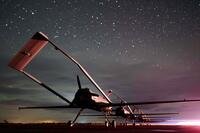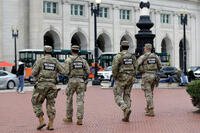American military personnel who participated in last summer's dramatic Thai cave rescue mission are now authorized to receive a Humanitarian Service Medal.
The Joint Chiefs of Staff approved the medal for Operation Wild Boar, a three-day mission to rescue a soccer team who'd been trapped in a series of caves for more than two weeks. The joint award is given to personnel who participate in a significant military act or operation of a humanitarian nature.
Only those who were in Thailand's Chiang Rai region between June 26 and July 14 will be eligible for the medal, according to the award guidelines. Troops must also have made a direct contribution to the rescue mission.
Operation Wild Boar was named for the soccer team of the same name that got stuck in the caves on June 23. The 12 boys and their 25-year-old coach became trapped when heavy rainfall quickly flooded the cave, blocking their way out.
Related content:
- 'Expecting Casualties:' How Airmen Created the Incredible Thai Cave Rescue Plan
- US Air Force Rescuer Details High-Risk Thai Cave Mission
- US Rescue Troops Helped Prep Way Out for Thai Boys to Escape Cave
Four days after the team was trapped, members of the Japan-based Air Force 320th Special Tactics Squadron were called up to assist. The airmen teamed with Thai Navy SEALs in what became a high-risk mission.
The boys and their coach had no food and were only reachable through narrow passageways in the uncharted maze of caves.
"We were completely honest when we were briefing some of the Thai leadership that we were expecting casualties, just because, even though we did as much mission planning and rehearsals, everything that we could possibly do, nothing has been done like this before," Master Sgt. Derek Anderson, a pararescueman with the 320th and team lead during the operation, said about the mission.
The airmen worked with Thai Navy SEALs and world-class diving experts to assemble a dive team. They staged oxygen tanks along the route and fed a system of ropes through the narrow tunnels to guide rescuers. The boys on the soccer team were given a sedative so they could be guided back out of the cave on stretchers while wearing breathing masks, since oxygen levels in some of the passages were so low.
One volunteer, Saman Kunan, a former Thai Navy SEAL who was assisting in the rescue, died after losing consciousness placing some of those oxygen tanks along the rescue route.
Over three days, the divers were able to make their way along the rescue route to reach the boys. It would take hours between each mission as the divers made their way back to the group and out of the cave. Eventually, all 12 of the boys, their coach and the 18 divers made it out safely.
"We were all kind of exhausted, but just kind of in awe that we pulled this off," Anderson said.
Operational commanders in the grade of 0-6 and above are authorized to determine whether their troops are eligible to receive the Humanitarian Service Medal. Upon approval, the commanders should submit a roster of those who were awarded the medal up their chain of command.
-- Hope Hodge Seck contributed to this report.
-- Gina Harkins can be reached at gina.harkins@military.com. Follow her on Twitter @ginaaharkins.












